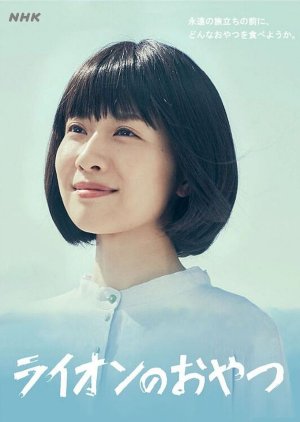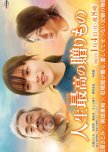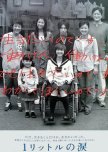
This review may contain spoilers
Raion no ie de, tsuraion. In Lion’s House, it’s difficult.
“Lion no Oyatsu” begins with our protagonist Sizuku-san’s arrival at the titular Lion’s House. The Lion’s House is a hospice, a place for patients with terminal cancer to pass their last few days in peace. They are taken care of by Madonna-san, the owner; Shima-san and Mai-san, the sisters who cook; Shin-san who draws. But despite all their efforts, “raion no ie de, tsuraion.” In Lion’s House, it’s difficult for these guests.If you are looking for a "happy story" then this isn’t the place. Over the course of the story, there are four deaths, each involving separation and grief. But even in grief there is a certain happiness that can be found at the Lion’s House, which seems to have a place for everyone. Having been established by Madonna-san, who is perhaps the most eccentric of them all, the Lion’s House has a place for Sister, a woman with dementia and her helper; for the cranky, for the kindly, for the crazy, for the lonely. More than a house, the welcoming aura of the Lion’s House with it’s teal and beige interiors have become a home for these people who have been united not by their disease, but by the strong lives they live, lives as strong as a lion’s.
One of the many charms of the Lion’s House is the Lion’s Snack. A gingerbread house in the dining room holds–in it's wooden safe–a number of letters, letters written by the guests of the Lion’s House requesting snacks connected to their life stories. These are prepared in the Lion’s House itself. Over these eight episodes, the sisters at Lion’s House cook a variety of porridge and snacks–Daohua, Imo Yokan, Apple pie, Tiramisu, etc. for it’s members and the stories are read out by Madonna-san. And it is from these snacks that we learn these stories and the story unfolds.
The Lion’s House is a space for cancer patients to pass their last days peacefully. And so, as I have already said before, there are deaths of four of the inhabitants. There is a constant undertone of sadness weaved into the story which can be felt throughout–it can be felt when the guests of the Lion’s House sing, it can be felt when Sizuku-san falls slowly in love, it can be felt in the beautiful waves that touch its shores.
But despite all the death and grief, at its core, “Lion no Oyatsu” is a story about life.
“Perhaps childbirth and death are like two opposite sides of the same coin. The difference is just from which side we open the door.”
—Madonna-san to Sizuku-san, Lion no Oyatsu (ep.1)
Lion no Oyatsu hints a lot at the life that could be. What could have happened if these people hadn’t been hindered by their disease–dreams yet to be fulfilled. It highlights a lot of regrets of the characters. It brings out the stories which these characters have hidden in the deepest corners of their heart but now, so close to death, comforted by the warm embrace of the Lion’s House, these stories are told. This drama took me to many places; it took me to the period of Japanese colonization in Taiwan and see the grief of a child born in a wansei family; it took me to a cafe in Paris; it took me to a sea which took its fishermen for retribution; it took me to sadder and happier places. With masterful use of cinematography and art, it made me feel these places and experience them as I would my own memories.
And what struck me most about "Lion no Oyatsu,” more than the cinematography and aesthetics, was how raw these characters were. That we can carry jealousy with us. That even though we believe it's selfish to fall in love so close to death, we still can't help trying to feel alive a bit more. That it isn’t easy to be brave in the face of death. And throughout this, Madonna-san is there with her ready affectionate smile to silently say that is okay. That it is okay to feel, to not accept death, to want to be alive, to want.
I teared up a lot during each episode. I was scared, so so scared by how similar I was to Sizuku. As for the other characters, I think the beauty of the story lies not in how much we relate to our character, but on how much they touch us even when we can’t. After each episode I was left with this immense hollowness and I was scared of what unpredictable stories each episode would bring.
“Lion No Oyatsu” will break your heart on it's knee, mend it with bittersweet memories, break it again and heal you again. To tell a story to your audience–especially one which is as character driven as “Lion no Oyatsu,” you need people who are able to convey it. 10/10 for the acting. All of these actors did marvellously. And when I say all, I mean all. Each story was written with a lot of care and emotional involvement and uniqueness. Without such a wonderful armada of actors, the show makers would be hard pressed to make “Lion no Oyatsu” as beautiful as it is.
Lastly, I would like to spare a few lines on Sizuku. Although she is the protagonist, she isn’t always at the centre stage and that, I believe, is what makes her character so suitable. Sizuku is a quiet character, she is used to being in the background, to take up as little space as she can manage without crushing herself completely. Seeing her finally unfurl herself in the Lion’s House was great. Her nature makes her a great confidante, people feel comfortable telling her their stories. In episode 6-7 I felt a bit put off by her behaviour, she was in the last stages of her cancer. And her feeble attempt at a joke made me sob suddenly, and I felt bad for being impatient. Point is that her character may seem a bit lifeless to some, especially near the end when her illness took over, but I don’t think so. She is a wonderfully flawed character and I love her all the more for it.
Also, for my second favorite character, Madonna-san. She imparts a certain magical charm to the story. Her perennial smile was admittedly a bit eerie at first but she is the force behind the Lion’s House, the force which provides warmth that no money can buy, the force that perseveres regardless of how many of her beloved “guests” die.
Lion no Oyatsu made me feel glad for every second that I breathe and I don’t hesitate to give it a 10/10.
“Lion no Oyatsu” has some hidden details. Like when Sizuku requests Madonna-san to make “so” sweets for her, the tension is heightened by that fact that “So” takes 3 hours to cook. 3 hours is short for us, but very very long for Sizuku who is at her deathbed. Kudos to the story writers and directors for this paced out and smoothly told story.
To get an idea about the use of cinematography, please check out these feed posts by me
» Teal/beige template: https://mydramalist.com/profile/Nada_SouSou/feeds/pDK2jhP
» Rokka!: https://mydramalist.com/profile/Nada_SouSou/feeds/v6vOwFx
» This got me emotional: https://mydramalist.com/profile/Nada_SouSou/feeds/jwWLmuj
» Something new: https://mydramalist.com/profile/Nada_SouSou/feeds/jwjN2cj
Was this review helpful to you?

This review may contain spoilers
..TODAY'S SNACK IS..
..maybe it's the story after all...
..not all ending ends happy - yeah for me it's a sad ending for me..
.
..my expectation for the ending was not grant..
.
..it only says that we are all die, we will remember by those people as what Madonna-san said as we burning out like a candle someone we lit up - that's living one's life to the fullest..
.
..first time to watch Kaho-san and she really cut her hair that short, but I will still look for some of her drama since a do love funny or comedy genre of my favorite actors/actresses..
.
..and the role of Madonna-san (from gyouretsu no megami) and Tahiti too (from renai mangaka)..
.
..all the casts performed well to me..
.
..even if the story goes like that, I still love the flow of the series - a masterpiece for me..
.
..it gives me a lot of lessons for important our life is - not only for me but for the other people too..
.
..thank you nhk..
Was this review helpful to you?

La régression pour rémission
Qui ne se souvient pas de ces goûters pris après la fin de la classe. Ces moments de partage avec une membre de sa famille, avant de retourner aux devoirs. C'est sans doutes ses souvenirs qui ont inspiré cette série à la sensibilité exacerbée.Autant prévenir tout de suite, si vous décider de vous plonger dans cette histoire, vous devez être sacrément préparé. Le thème principal, comme celui des 8 épisodes est notre rapport à la mort. Et quelque soit votre âge, votre sensibilité ou votre vécu, vous ne sortirez pas indemne de ses goûtés qui font remonter les souvenirs des patients en convalescence, qui vous le comprendrez très vite sera leur dernière demeure. Les pensionnaires dont les maladies ou la fin de vie vous toucheront à un point au delà des frontières et des cultures avec un jeu sincère et remarquable. L'idée de cette Madelaine de Proust, qu'est un gouté pris chaque épisode et choisi par l'un des pensionnaires, semble excellente pour faire remonter les souvenirs, même si elle sonne souvent comme la dernière cigarette du condamné.
Prévoyez donc un camion de mouchoir en papier, car chaque épisode vous arrachera des larmes et pas seulement Tsuchimura Kaho et Ryusei Ryo, les acteurs principaux peu habitués des premiers rôles, mais qui forment un joli couple à l'avenir ensemble impossible. Madonna, la responsable de l'EPAHD, vous fera d'abord rire et vous vous demanderez rapidement si vous n'êtes pas tombé dans une convention de cosplay. Mais ça ne durera que quelques secondes et cette fantaisie sera bienvenue pour les patients et pour le spectateur. Tous comme cette gentillesse que l'on trouvera fausse et exagérée le temps d'un battement d'ailes de papillon cette fois, tant l'atmosphère lourde et la disparition subite des personnages nécessitent cette légèreté et cette bienveillance de chaque instant. On comprend à quel point cela doit être difficile de travailler dans ses lieux.
Les décors et la mise en scène sont somptueux, pour ce genre de mélodrame. La NHK sait mettre les moyens, quand il s'agit de toucher au cœur des gens et des générations. La mort et la vieillesse sont des thèmes centraux au Japon et vont le devenir en occident comme un retour de bâton après des décennies de jeunisme. Et c'est déjà le cas depuis le début de la pandémie de COVID. En abordant avec le soin d'une belle production, la chaîne publique montre une nouvelle fois à quel point elle œuvre pour le bien de la nation japonaise en particulier, mais surtout pour l'humain en général.
Certains y verront des clichés avec cette retraite sur une île verdoyante et ses décors d'îlots au loin, ses fermiers retournés à la terre, après une vie urbaine ou cette trop grande bienveillance même pour l'héroïne qui ne veut pas déranger ça famille avec sa maladie et du coup qui sonne faux pour nous occidentaux. Mais ce drama nous met fasse à nos angoisses sur la mort, la veillasse et la maladie et devrait pour les jeunes et moins jeunes générations mettre définitivement un point final aux interrogations sur le bien-fondé des mesures prises pour protéger les personnes fragiles durant la COVID.
Was this review helpful to you?








































